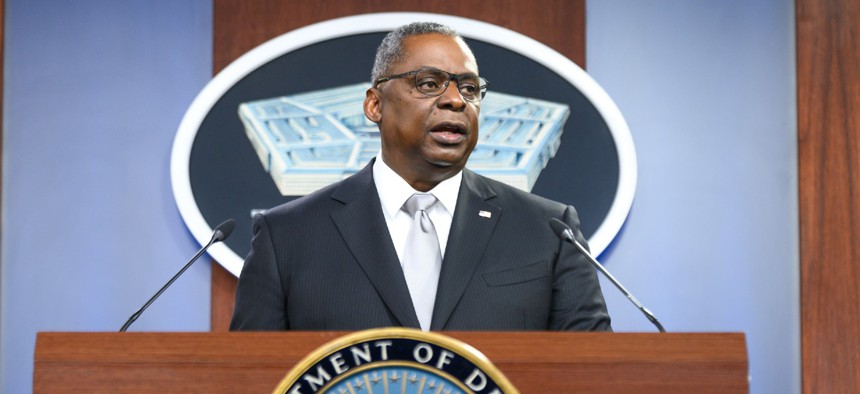The Defense Department Fails Its Audit Again, But Officials Have ‘No Doubt’ It Will Eventually Pass

Defense Secretary Lloyd Austin III said he was happy with the department's progress, but "the fact remains that we have much work to do." Sgt. Jack Sanders / U.S. Air Force
This was the fourth time the Pentagon completed an audit since it became a requirement in 1990.
For the fourth year in a row, the Defense Department failed its annual financial audit, but demonstrated it’s making progress.
On Monday, the Defense Department completed its annual audit required by the 1990 Chief Financial Officers Act for the fourth time. The department’s inspector general and independent public accounting firms conducted the fiscal 2021 audit, which covered the department’s more than $3.2 trillion in assets and $3 trillion in liabilities. About 1,200 auditors did 278 in-person and 1,069 virtual site visits.
“Although we do not yet have a clean opinion and we have a long way to go, I will note that over this past decade we have done what we have told the Congress we would do when we said we would do it,” said Michael McCord, undersecretary of Defense (comptroller) and chief financial officer, on a briefing call with reporters. “We believe we’ve made steady progress in unmodified opinions achieved or expected to be achieved from several of our standalone audits that cover approximately 37% of our total assets.”
However, McCord said, “as expected, the overall department got a disclaimer of opinion on our consolidated financial statement,” which means the auditor has no opinion on the financial statements. This could be for a variety of reasons.
The Defense’s Department’s annual financial report for fiscal 2021 released early on Tuesday contains information on the audit, among other things.
“Of the 26 standalone audits, six reporting entities received unmodified opinions (i.e., auditors determined the financial statements were presented fairly and in accordance with generally accepted accounting principles), one reporting entity received a qualified opinion (i.e., auditors concluded there were misstatements or potentially undetected misstatements that were material, but not pervasive to the financial statements), and 17 reporting entities received disclaimers of opinion,” said the report. “The standalone audits for two reporting entities, the DoD [Inspector General’s Office] and the Defense Information Systems Agency Working Capital Fund, are scheduled to conclude in December 2021.”
Auditors also use material weaknesses, which are deficiencies in internal controls, and notices of findings and recommendations to measure progress, which the Defence Department “continues to monitor,” said the report.
Last year, Thomas Harker, then-Navy top budget official who was also performing the duties of Defense Department comptroller, said he didn’t expect the Pentagon to achieve a clean audit until 2027. On the call with reporters on Monday, McCord neither firmly agreed nor disagreed with that timeline projection.
He said in a statement that he has “no doubt...we will reach our goal of achieving an unmodified audit opinion.” He also lauded his organization for its role “supporting other department-wide high-visibility [fiscal] 2021 objectives including, transitioning administrations, supporting our troops and the nation in response to the COVID-19 pandemic, and withdrawing our troops and Afghan allies from Afghanistan.”
The Defense Department has an annual expenditure of about $800 billion, so the approximately $207 million cost of the audit—which represents .03% of expenditures for the year— is a “highly positive investment in transparency, accountability and efficiency for the American people,” said a fact-sheet from the department.
“I was glad to see that areas critical to supporting our men and women in uniform such as civilian pay, military pay, and the military retirement fund passed their audits, but the fact remains that we have much work to do,” said Defense Secretary Lloyd Austin III, in a statement. “Make no mistake: none of us at the department are content with the overall results of this audit. But we are committed to learning from it and to doing better. We must work harder to institute stronger internal controls and prove in every way that we are being good stewards of taxpayer dollars.”
The financial watchdog group Truth in Accounting has issued reports on the past three audits.
Following their most recent analysis, published in March, Bill Bergman, Truth in Accounting’s director of research, told Government Executive, “They are making progress in the sense that they’re finding more problems than they resolve.”
Then in May, a group of senators introduced bipartisan legislation that would require the Pentagon to pass a full, independent audit by fiscal 2022. Any department component that failed to do so would have to return 1% of its budget to the Treasury Department to help with deficit reduction. Lawmakers in the House introduced a similar version in July. Neither bill has been voted on yet.
Related, on Monday, President Biden announced his intent to nominate Robert Storch–– currently IG for the National Security Agency/Central Security Service–– to be IG for the Defense Department. That position had lacked permanent leadership for 2,138 days as of Tuesday morning, according to a tracker on Oversight.gov.
NEXT STORY: Quick Hits






